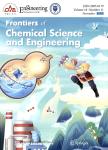Computational catalysis on the conversion of CO_(2) to methane—an update
作者机构:Department of ChemistryMadras Christian College(Autonomous)(Affiliated to the University of Madras)Chennai 600059“Tamil Nadu”India Department of ChemistryBishop Heber CollegeTiruchirappalli 620017“Tamil Nadu”India Department of ChemistryMepco Schlenk Engineering College(Autonomous)Sivakasi 626005“Tamil Nadu”India
出 版 物:《Frontiers of Chemical Science and Engineering》 (化学科学与工程前沿(英文版))
年 卷 期:2024年第18卷第11期
页 面:291-333页
核心收录:
学科分类:081704[工学-应用化学] 07[理学] 070304[理学-物理化学(含∶化学物理)] 08[工学] 0817[工学-化学工程与技术] 0703[理学-化学]
基 金:National Key Research and Development Program of China(Grant No.2022YFE0208400)
主 题:computational catalysis single atom catalyst CO_(2)reduction metalloporphyrins double-atom catalyst graphitic carbon nitrite
摘 要:The reliance on fossil fuels intensifies CO_(2) emissions,worsening political and environmental ***_(2) capture and conversion present a promising solution,influenced by industrialization and *** recent times,catalytic conversion of CO_(2) into fuels and chemical precursors,particularly methane,are gaining traction for establishing a sustainable,carbon-neutral economy due to methane’s advantages in renewable energy *** homogeneous and heterogeneous catalysts are available for the conversion of CO_(2) to methane,the efficiency is found to be higher in heterogeneous ***,this review focuses only on the heterogeneous *** this context,the efficient heterogeneous catalysts with optimum utility are yet to be ***,the quest for suitable catalyst for the catalytic conversion of CO_(2) to CH4 is still continuing and designing efficient catalysts requires assessing their synthetic feasibility,often achieved through computational methods like density functional theory simulations,providing insights into reaction mechanisms,rate-limiting steps,catalytic cycle,activation of C=O bonds and enhancing understanding while lowering *** this context,this review examines the conversion of CO_(2) to CH4 using seven distinct types of catalysts,including single and double atom catalysts,metal organic frameworks,metalloporphyrins,graphdiyne and graphitic carbon nitrite and alloys with some case *** main focus of this review is to offer a detailed and extensive examination of diverse catalyst design approaches and their utilization in CH4 production,with a specific emphasis on computational *** explores the array of design methodologies used to identify reaction pathways and investigates the critical role of computational tools in their refinement and *** believe this review will help budding researchers to explore the possibilities of designing catalysts for the CO_(2) to CH4 conversio



